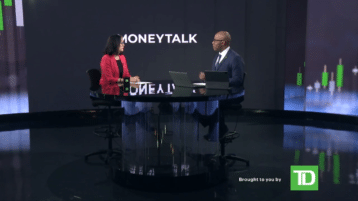Print Transcript
[theme music] [theme music] >> Hello, I'm Greg Bonnell. Welcome to MoneyTalk Live, brought to you by TD Direct Investing. it's a new program broadcast daily on WebBroker. Every day I will be joined by guest from across TD, many of whom you will only see here. Will take you through what moving the markets and answer your questions about investing. Coming up on today show, I will be speaking you with Colin Lynch, head of global real estate investments at TD Asset Management. With inflation on the rise, easy money has already been made in the sector. In today's WebBroker education segment, Kaitlin Cormier is going to show us how to get information on real estate investment trust using the platform. Here's how you can get in touch with us. At moneytalklive@td. com, where you fill out that your response box here on WebBroker. Before get to our guest today, let's go to an update on how the markets are trading. The action is on Bay Street today with the Americans off for the Juneteenth holiday. this index is holding its own. It's up about 1% right now. Seeing some weakness in energy and materials, but also some strengths in technology names and also some of the telecom players. Among the names and the upside today on Bay Street is home capital group, is making again today with about 6% at this hour. Among the Lakers are many of the gold names, including young manacled. Their shares are now down about 2%. As we said, Wall Street is closed for the Juneteenth holiday but we are almost at the halfway point of the year. Let's check in on the action up until Friday. Obviously it has been a tough one in a rising rate environment as we near that halfway point at 2022, we have the S&P 500, the broader REIT of the American market, down about 23% year to date. Obviously the base has been hit considerably harder when you take a look at the NASDAQ 100, were talking but an index down roughly about 30% year to date. One of the big stories this year has been the one that we've seen in the US dollar, and that is meant a few things for some companies, including companies like Microsoft and Oracle trying to repatriate overseas money into US bucks real estate has clearly been… For investors in the era of cheap money. With interest rates on the rise, our guest today says the easy money has been made. Colin Lynch, great to have you on the show. Let's start there. We've seen it across so many asset classes and we know that the rising rates are definitely having an effect. What has that meant for real estate for? >> First off, great to be here in great to be here in person. Very excited for our conversation today. there are implications across the real estate world of rising rates. ultimately of a couple things happen, ultimately real estate investors use debt to acquire and manage properties. When you have a rising rate environment, the cost of debt increases and means the price that individuals are able to pay for different kinds of real estate becomes lower as a result of higher finance and costs generally. As a result, there is a little bit less capital that looks for a home in real estate assets. Also, the world changes as it relates to public equities and fixed income. Real estate in a space with alternatives, investors have a choice between alternatives, fixed incomes and… As rate roots rise and as income rises in the fixed income world, that has implications as to how investors look to deploy into public equities and to the real estate or alternative space. >> You say that easy money has been made. He laid out the scenario we are living through. Where do we go from here as investors? It sounds like an environment in which to sharpen one's pencil. >> Exactly. There is still a lot of opportunity in the real estate space. I think that's important to note. If we step back and look over the past 30 years, we have seen an environment where rates have come down and as a result, some of those financing costs have become more attractive as rates have come down, and that's affected probably all sectors, whether it's industrial, office buildings, shopping malls, whether it's multi residential or apartment buildings. Going forward, it's important to really sharpen our pencils, to look at the fundamentals of the real estate, to look at things like location, to look at things like rent. Can rent increase over time? What will drive that growth of rent? Ultimately, that will produce growth in income, in an inflationary environment, where interest rates are on the rise, it's very important to identify those assets that have great income growth potential, and that's where the differentiation will be between the haves in the real estate ruled and the have-nots. >> Real estate is a great discussion to have because there are so many facets. He talked about doing the homework, looking at the fundamentals, figure out profitability, cash flow. Our certain sectors starting to look better in the rising rate environment? >> Certainly, broadly put, and asset that has good potential to grow income will perform better in this environment. First let's look at multiunit residential. These are apartment buildings. If you look across Canada, for instance Alberta, where we've had depressed rents, and now with some optimism for the oil and gas sector around population growth, we are seeing growth in rents as a result of more people moving to Alberta, and that produces a positive dynamic. Stateside, the US Sun Belt, so this is Atlanta, Raleigh, Durham, Austin, Dallas, all of those markets we've seen over the last 20 years who, significant growth in populations and that produces growing rates. So in the multiunit residential space, those would be attractive areas. If we look in retail, what we have seen in retail, retail is very broad, first off. So you have shopping centres, many were shut down during the depths of COVID,many have reopened. Spending is a period >> It's been a long time since I spent a lot. So why not? >> Exactly. And I was doing a bit of that shopping over the weekend as well. so we are seeing that, and as a result, some retailers are beginning to be more optimistic in terms of expansion plans and the like. So there is some optimism there, but you look in another part of retail, grocery stores, and grocery stores have boomed in 2020 and then 2021 as many of us went to grocery stores to procure those items because we weren't able to go to restaurants. A lot of investors looked at grocery stores for the first time and said, "Look at this asset right and get a 6%, 7%, 8% net operating income yield, and it has stabilities, and this asset will be around likely for a long time, because we only grocery stores. So that sector has been quite attractive and we think will continue to be attractive in a rising rate environment because you are getting a six, seven, 8% yield. Those sectors we think will perform well. Then we have industrial. What's industrial? Industrial has everything from light factories all the way through to big distribution hubs, where you get your Amazon boxes for Amazon warehouse is in the like. There, it is important to look at what is the potential for growth? If you have an industrial facility where you have leasing and the leases have another 10 years and the rents are going up by 1% per year and if insulations at 5%, well, that's a little bit less attractive. Conversely, if you have a facility where the rents are going up by CPI, and it's great in terms of location, whether it's last mile or it's connected to highway infrastructure, that's a little bit more attractive. So it really, really depends within the industrial space. Lastly, we have offices. >> Some of us have actually returned to offices, despite the broader trend. >> That's right. And it's fantastic to be in person. Though we recognize that not everybody has returned in person. And I don't think we will have full clarity on that for at least a few monthsuntil relieved the health dynamic is fully stabilized. So there, you really have to sharpen your pencils and look at what type of office is future proofed. And it's that type of office, well located, well amended ties, high on ESG, that type of office that will perform better because it's that type of office that will draw employees, give employees a reason to come back into the office. So those will perform well. Conversely, if we have offices that are older, less attractive inside… >> You don't feel is great about going back to them. Why would I leave the comfort of my spare office? >> Precisely. And if you have a horrendous commute to get there, that's even a greater disincentive to come back to the office. And tenants know that. And so we think some of those offices, in the real estate world, we call them class B or C, will be challenged going forward. >> Before we finish our opening conversation, we are living in a rising rate environment. We have been talking about that. There is a fear, reflected in the equity markets, that aggressive central bank action could bring on a recession. Is there anywhere to hide in real estate if we end up in a recession and six, 12, 18 months from now? > Great question. Multiunit family, multiunit residential, has traditionally been the place to go because at the end of the day, we need to live someplace. And I would say today, as rates rise, it becomes more expensive for somebody to afford a home. If you layer in potential volatility in home prices, we have had a spectacular run-up, I think some out there are calling for some moderation or depreciation, that will increase demand for multiunit residential, i.e. apartment units, even further. If there is been a place it's been historically the way to go during a recession, its apartments, and today it's no different. Apartments are likely going to be more resilient space. Not to say that there won't be any depreciation and apartments. There might be, but that depreciation and that volatility will be less than in other sectors. > Great start to the program. We are going to get your questions for Colin Lynch in just a moment. It just a reminder, you can get in touch with us at any time. You can email moneytalklive@td. com more fill out the viewer response bonds under the video player here on WebBroker. We want to update you on some of the biggest stories and how markets are trading. Could be another challenge for already strained supply chains in Canada. Some 750 communications and signal operators one to on strike at CN Rail when union negotiations broke down. They say they have a contingency in place. They gave their 72 hour strike notice last Wednesday. Rogers community Association says a deal to sell its freedom mobile is an astute category. The transaction is valued at $2.85 billion and is aimed at appeasing regulators as Rogers works towards its proposed takeover of Shaw Communications. The competition Bureau has been opposed to the Rogers Shaw transaction, saying it would lessen competition. In a release, Rogers, Shaw and Québecor. . . Glenn Coors says its profits for trading commodities will surpass $2.2 billion for the first half of the year. That's more than Glenn court traditionally reports in an entire fiscal year. The conflict in Ukraine has sent commodity prices soaring and the volatility is powering their trading operations. In making the announcement, they say they expect trading conditions to be closer to normal in the second half of this year. Of course, we have Wall Street on vacation today. Let's take a look at the TSX Composite Index as it trades on a US holiday firmly in positive territory. 218 points right now, little more than 1%, after a rough week last week. We are seeing some strength in technology names and some of those telecom names as a back that Rogers, Core news that broke over the weekend. We are seeing a bit of weakness in the energy trade and some of the mining stocks today. That tier market update and news headlines. Let's get to the questions for Colin. Many companies are going to hybrid work models, work from home. Does it kill the need for office towers? To me, hybrid suggests a little bit of this and a little bit of that. >>I think that's right. I think long-term you will have a little bit of this and little bit of that, meaning a little bit of in the office and a little bit of at home or, candidly, in coffee shops or in libraries or other places. I think important to note we had that before the pandemic. This represents a growth in flexibility for folks to work in different places. Some at home, some in the other places, some of the office. What does that mean for office over all? I think that means that demand for office will moderate and in some places will decline. I think we go back to a point that we talked about earlier: quality offices. Ultimately, the office needs to sell the employee, sell the tenants, to say that this is a great place to be. Location, fantastic amenities, great airflow in terms of health, and also great opportunity to interact and to network with other folks within the firm or within other firms within the office. And so those offices will perform well in that environment but there will be some offices that will be challenged, and that's because they don't have the same amenity package on offer to their employees and tenants. >> When I think about it, some of those higher quality products that have those amenities, is there concern about consolidation? If you come to an agreement with your workforce and say, 2 to 3 days a week, you can be in the office, we've already seen hotel in, you don't have a permanent desk, you walk in and plug-in, with these companies need less space? >> Possibly, we saw this trend happened worldwide. It's interesting that before the pandemic, I would travel around the world and I'm happy back on the road but the types of offices that I would see, whether it was in Tokyo or San Francisco or London, remarkably similar. And so these offices, for instance, would have open concept, rows of desks, multiple laptop screens, it was incredible. Very similar concept worldwide. And I think the concept will yield itself well to that hotel laying environment. But I would give one caution. We are sitting here in June 2022. We began the year extremely worried about omicron and many parts of the country shut down. Why do I say this? I say this to say we don't have complete finality on what the health dynamic is, and so there are a portion of folks that are quite worried still about going into the office environment. So it's very hard to make a conclusion definitively on what the future of offices, how we are going to be working, because we are still going through the readjustment back to normal life. There is still a significant proportion of people that do have health concerns coming into the office and so I think that in the next 4 to 5 months, we are going to get further clarity. We will get further clarity on what working models look like and we will know more definitively. But it's hard to guess. Let's offices for sure. Less space required. Will many companies go to a virtual environment? No, in my opinion. But will many companies have more flexibility and effectively a hybrid environment, which we had pre-pandemic, we are just realizing today, we are calling a hybrid and more folks have that flexibility to work in different places and different ways. >> Got a question coming in about the selling pressure we've seen on some of the big e-commerce names. Big winners during the pandemic but now some of those stocks including Amazon under pressure. They had big plans for growing operations and that brings us back to the industrials. What does it mean for real estate when it comes to those warehouses? Or they call them fulfilment centres, the nicer word. >> That's right, fulfilment centres, absolutely. Look at, industrial real estate worldwide has had a spectacular increase, spectacular in any sense of that word when you look at the returns, but even more spectacular when you look at it from a real estate perspective. In the US, there been 50% gains in industrial real estate, I would say that is unheard of. Now, if we go back to 2020 at the start of the pandemic and look at the forecast for e-commerce growth, and at the end of the day, what's driving this run-up in the industrial is the belief that we will have further e-commerce growth, further consumption of goods like this. The forecast of 2020 showed an acceleration and then a deceleration and then a further acceleration. In 2020. And I think that's what we're seeing. So we have seen the acceleration. The deceleration comes from, "Okay, now we can go back to the stores. Now we can go and do things in person. As a result, the proportion of e-commerce consumed online goes down. But the long-term trend is also important. We are moving to a more e-commerce, more Internet, more do things in an omni-channel environment, more devices that are capable to do more things like shopping, and so long term, that e-commerce trend will continue to grow as we have infrastructure built throughout the world, including in Canada. So my surprised on the Amazon or e-commerce share rundown? No, not at all. Is there going to be headwinds for the industrial real estate space in the near term? Likely. We will we see that play out in Canada and other countries? Absolutely. Is there going to be long term a greater demand for industrial space? For sure. The question is, how long is a short-term to the long term? And how long do you have to see through what we will see in the short-term? >> A perfect follow along to this, perhaps one of our viewers had it in mind as we were discussing e-commerce, industrial warehouses, the end of lockdowns, is brick-and-mortar retail making a comeback? >> Certainly, yes. As we talked about revenge shopping, we have seen a bit of what's called revenge shopping. It is making a comeback, whether at shopping malls, whether it's high street retailers throughout the world, and whether it's other forms of retail like restaurants and other places where you consume food and beverages. All of that's been making a comeback, absolutely. It's about time? Yes. >> I do the cooking at home. I like my own cooking, but I'm so happy to have other people cooking for me on occasion. >> ER, it's great, right? It's wonderful. So the retail space has been challenged over multiple years. If you go back 2015 all the way to the start of the pandemic, the worst-performing real estate sector was retail. Why? Because of that e-commerce long-term trend. But within retail, the best-performing area of retail were those restaurants or those gyms that were shut down in the pandemic. So coming forward today, ultimately, if we have the health situation under control, it's likely that those leisure parts of retail will continue to perform well, those gyms, those restaurants, etc. Then, the grocery stores will probably continue to perform well, though lots of investors have lots of interest in that space. The question is, shopping malls and enclosed shopping centres. There are, the best ones, so in Toronto, as an example, the Eaton Centre or York Dale in Montréal, Laval, performed pretty well because those who become destinations in and of themselves were you do not just shopping but you do other things. What will be more challenged are called the class B and class C shopping centres, the smaller enclosed areas that aren't really located to well that are selling goods that are increasingly sold online. Those would be a little bit more challenged. Even after we come fully out of lockdown and staying at home, long term, some of those centres will be a little bit more challenged. >> Will take a break and come back. Make sure you do your own research before making investment decisions. We will get back to those questions in a moment's time. You might want to get more into us. Moneytalklive@td.com is the email address you can contact us at. Right now I want to get to our educational segment of the day. For do-it-yourself investors, one way to get exposure to the real estate market is through real estate investment trust, and the WebBroker platform has tools that can help you research the sector. Joining us for more now is Kaitlin Cormier. Great to have you with us. Let's jump in. It's an easy way for us to find and compare rates on WebBroker? >> Absolutely. Thanks so much for having me, Greg. As always, it's a pleasure. With WebBroker, we have a tool to help you narrow down all of the different investment types that are out there to what you're specifically looking for. In this case, of course, real estate investment trust or REIT S. We are going to go on our research tab and we will choose under tools and click on screeners. So when we get to this page, instead of looking at presets, we are going to build our own screen with the criteria that we are looking for and the investment type that we are looking for. There with me for a second. We are going to click on this button, screening. It does have some things that are pre-put in there. We are going to go ahead and clear everything to start from scratch. To begin with, we are going to look at the more criteria button. It's going to bring up a ton of different options we can put in. We are going to click here on company basics on sector and industry. Within that, I'm going to clear everything and just look at real estate and specifically I'm just going to click on REITS. that gives me some narrowing down but I have more than 400 matches but that's too many. let's add some additional criteria to narrow this down further. Let's talk about dividend yield. So we will go under dividend, dividend yield. Let's put a minimum in of about 5%, thinking of inflation, we want to make sure we are getting a decent return on our dividend. We can look at earnings per gross, so we can look at our five year historical. We want a minimum of zero, we don't want any negative there, and then also we are going to look at price-performance. So click on more criteria one more time and we are going to look at the price performance here today, so just to have that there is well. We can see in the top left-hand corner, we now have 48 matches which is a lot more manageable to go through than the 400 we had previously and to see those matches, all I have to do is simply scroll down and it's going to give me the top 10 on this first page and I can continue to move forward and see the rest of the 48 matches. Again, is showing us the criteria we discussed so that price-performance, earnings-per-share, dividend yield and history, and I can rearrange this list based on any of this criteria. I can click dividend yield if I want to see. >> What if we want to see how this list would've performed? >> Absolutely. So another important thing, we want to see was going on if we had gone through the process of purchasing these investments. Again, within the same tool on WebBroker, what we are going to do is scroll down, so we are going to take our results, scroll down further, and what we see down here is actually our historical performance of this particular batch of investments. So I can choose different time frames. Looking here, this is if I would buy and hold for three months, how it would perform, then I can see for a five year period of time, so going all the way back to 2017, and showing me the performance, I can also choose, for example, just by sliding to three year performance, I can see three months, just have to slide this along to see those different performances and then we can also compare it to different industries. So if we want to do that, we could check out the performance. So showing us that information right there. >> Great stuff as always. Thanks. >> Thank you very much. >> Kaitlin Cormier is a senior clients… Make sure to check out the learning centre on WebBroker for more educational videos, master classes and webinars. Before we get back to your questions, reminder of how you can get in touch with us. To have a question about investing or what's driving the markets? Our guests are eager to hear what's on your mind. Send us your questions. There are two ways you can get in touch. You can send us an email any time@moneytalklive@td.com or you can use the question box right below the screen here on WebBroker. Just ration your question and hit send. We will see if one of your guests can get your question answered here at MoneyTalk Live. We are back now with TD Asset Management's, Colin. We have another question coming in. In the age of inflation, do we think of real estate as an inflation hedge or not? >> Great question. Generally put, real estate tends to be a good inflation hedge, though what is also important is where in the economic cycle are we? So if we have a rising inflationary environment, we have economic growth and expansion. Real estate is a very good inflation hedge. If we have, however, high inflation but an economic environment that is more challenged, i.e. stagflation, real estate is okay, but not as good as the environment where we have significant growth and significant inflation. Here's the reason why. Ultimately, what is real estate? Either you are building an asset or you're owning and operating an asset that is generating income. So if you own and operate an asset generating income, you either have rental growth, hope they not declines, and expenses. So if you have great economic expansion, you have the ability to raise rents and you keep your expenses under control and you have growth and that growth could be higher than inflation, so fantastic. But if you have an economic decline, then the question is, how are you able to raise rents, how are you able to keep expenses under control, and how does that compare to high inflation? Who could have a situation where operating income grows pretty well relative to inflation even though you have more economic distress, and that goes back to what types of assets do you have. However, you can also a situation where you can't raise rents and you have expenses that go up like material, and then your net operating profit goes down and thus challenging. In general, real estate does have the potential to be a good inflation hedge. >> Here's a question coming in from the platform. There is been a lot of talk about big private equity firms building portfolios of single-family homes. The talk almost seems more like the concern. What are you seeing out there? Do we need to keep her eyes on this? >> I think there is potential for that to happen in Canada for sure. If you look stateside, this is a space that has grown. There have been a number of investors, institutional investors, that have acquired homes. In the space, it is called single-family rentals, and that space has grown and grown and grown. In Canada, we haven't seen that yet, though there is some potential for that to happen for sure. > Let's talk about geopolitical conflict. Obviously what's happening with the Ukraine has affected so many parts of the global economy. We don't often think about in terms of real estate. Is there a connection there? >> Certainly there is. Geopolitical conflict impacts the world economy, and what is real estate? It is fundamentally a service provider to the economy. So providing space for offices, space for people to live in, space for folks to get packages, that's what we're doing. So economic growth is hindered, that clearly has an impact on real estate. When you look at the geopolitical conflict today in the case of what is going on in Europe, the biggest impact from an economic perspective is likely to be in Europe. We have both the impact on demand, which we talked about in the case of GDP. We also have impact on supply. As you combine the geopolitical conflict with the pandemic, we have seen a desire to on sure a lot more. That means have higher inventories. That impacts what is flowing through the supply chain and what houses the supply chain? A lot of industrial real estate. There's a lot of impact there. There's a lot of impact on offices. If you have an economic shock, companies that aren't expanding is fast, not taking up as much space, so you have the potential for space reduction in terms of offices. If consumers are feeling pinched and need to tighten the belt a bit because the economic world is changing, that has an implication for retail as well. So you got two things happening. You have the geographical interplay and those countries closer to the conflict have a greater impact. And then you have the property type of impact where the implications are different depending on which area of real estate you're looking at. >> When you talk about the geographic implications, the closer you are to the conflict, the greater the influence. Canada has been known as a long time is a pretty stable, safe place to make investments. Is there anything about these geopolitical trends that would make Canada a more attractive place for an investor? >> Yeah. You've hit the nail on the head. Canada has, in the last 3 to 4 months, as Itravel to different countries, I've heard a greater interest in Canada. We have a relatively stable geopolitical environment. We have a good rule of law, which not all countries have. We have a stable real estate environment with institutional entities that take a long-term view by and large to real estate. We have demographic growth, robust immigration policy and the practice of welcoming people from around the world, the latest example being welcoming refugees. Everyone looks at this and says it's a fantastic country, a great real estate environment. As a result, even though we've had fantastic real estate performance, to Canada has been at the top countries worldwide the last 30 years, people anticipate that trend will continue because of all of those elements. Those are foundational elements to agree performance in the real estate space. >> Back to your questions for Colin Lynch in just a moment. Reminder, you can get in touch with us at any time. Give a question about investing or what's driving the markets? Our guests are eager to hear what's on your mind. Send us your questions. There are two ways you can get in touch with us. Send us an email anytime you add moneytalklive@td.com or you can use the question box right below the screen here on WebBroker. Just ration your question and hit send. We will see if one of our guest can get your answer. You'd think the price of gold would be a winner but it hasn't performed as well as anticipated by some TD securities has any report on the sector. When he is now to break it down is money talk to Anthony Okolie. >> Gold prices to client last week. TD security is suggested that it made advisors reduce exposure to gold. Rejection of high rates… Traders to increase their short positions in gold. Last week it was said the Fed is leaning to a more front and cycle. It could be much tougher to bring back in the future. As a result, TD securities expects more hikes this year with a Federal Reserve turnaround rate ending around 4% by year end. Looking forward, TD securities expects that these high rates should go lower. Gold is currently trading around $1800 US per ounce which is down from an all-time high of just over $2000 per ounce in the first quarter. That was the beginning of the Ukraine Russian conflict. >> You talk about rates and the impact on the relationship there. We know that when you raise interest rates, there is an impact in the relationship with the US dollar. To talk with us about the US dollar. >> A headwind for gold and we know as the US dollar increases, gold depreciates and that makes it much more expensive for overseas buyers to hold gold, particularly in other currencies. That's another risk or headwind we are seeing with gold prices going forward. Interesting. Thanks. >> My pleasure. >> As a reminder, TD securities is a trademark of the Toronto Dominion Bank. Let's take a look at the markets. Wall Street is not treating today. It is the Juneteenth holiday south of the border. We are trading stocks on the Bay Street. The TSX Composite Index up a healthy 1% right now. We are seeing strength and technology names and some telecom names including chemical or, top of the show talking about Québecor communications selling… Telecom sector today. Telecom's are showing strongly. Québecor among them, almost 6%. 29, 28 a share. On the other hand, a weakness in energy names and mining names, especially gold miners. Oceana to the downside at this hour to the tune of about 3%. South of the border, they are not trading stocks, but let's check out the S&P 500. We are nearing almost the halfway point of 2022 and it has been a rough run. The S&P 500 has been down about 20%. Tech stocks getting hit harder than that. Let's get back now to our questions for Colin Lynch, head of global investment and research at TD Asset Management. Take a look at the platform. Another question coming. It lots is been said about the affordability crisis in residential real estate. What's your take? >> We have had this crisis for a number of years. In the UK, it's the first time I heard the words housing crisis, that was in 2018. That crisis has persisted throughout the pandemic. US, same, and then certainly in major markets here in Canada, Vancouver, Toronto. We've had a major affordability crisis. That has become worse in the pandemic. We saw a significant increase in prices and housing and we've also now are seeing increases. That has gotten worse. What's the cause? Well, many will say, and I do agree, that you have to go back to the principles of economics, supply and demand. There is clearly a lot of demand in areas where we've seen a lot of population growth. That's in Toronto, Vancouver. We are increasingly seeing that of Montréal. You look in the US, the Sun Belt, it's the same. For those not as much population growth, you don't see as much demand and as a result we have not seen as much pricing pressures in some of those markets, like Calgary, Edmonton, etc. Supply, however, is a big issue. It takes a long time, in many markets, to be able to deliver new inventory. There is a significant process that's required and it takes years. In addition to that, there are costs associated with going through that. In the real estate industry, we call it heard costs, it's the materials and so on. Then there are soft costs, whether that's permitting, other costs associated with getting something approved, those have increased by a huge degree in the last 5 to 10 years. As a result, we are building less over time and what we are building is costing more. And that is producing a situation, back to demand and supply, were demand is growing, supply is growing but not as fast as demand. As a result, you see an increase in prices, that's creating a crisis in affordability and that's because incomes have not grown as fast as prices have grown. This is been a long term trend made worse in the pandemic. > From an investor's point of view, in an affordability crisis, the affordability comes up. As an investor, how should you view a property that has rent controls in place? >> Yeah, it's more nuanced. Market by market by market, there are different regimes around rent control. There is some like in Alberta where there is is no rent control. There is some that have had temporary red control due to the pandemic, and then there are others like in Toronto in Ontario where there is rent control for only certain types of buildings built in certain use. First step is understanding the nature rent control. Second step to understand is what is the desire of the owner of the property? So when you have rent control, you have a certain proportion of units that are vacant, people turnover, they go look for another place, etc. Sometimes those units can be brought to market in terms of rent. So even though 95% of individuals will only increase, see an increase in rent on a CPI or inflationary basis, there is the potential of the 2 to 4% of units that are turning over to bring those units to market rent. Then there is some that have a strategy around renovations. Let's be clear, not renoviction, which is purposely evicting somebody under the premise of doing renovation to jack up the rent. we see this happening. Versus renovations which is somebody is moving out on their own free will and there is a desire to bring that unit from Collett 1990 standard two 2022 standard, and on the basis of that to have a program to recoup some of those costs over time. There also renovations where substantially the entire building is being decommissioned for whatever reason, whether it's to improve the environmental dynamic, so ESG is incredibly important and if you can reduce the carbon emissions for a property, you do a great thing for the entire society, so there have been programs to completely redo buildings, to retrofit them to be able to bring them up to a greater carbon standard. As you can tell, you have to go into the nuances to what the strategy is. It's a strategy to future proof the property, which could be a good thing. It's a strategy to ask folks to move out, to then do selected renos, is it to renovict? it's important to understand that strategy. >> Looking forward to next time. >> Thank you for having me. >> Called them Lynch, head of global real estate and investment at TD Asset Management. Make sure to do your own research before making investment decisions. We are just getting started this week. Got a lot of great guests lined up for you this week. Tomorrow we will focus on income growth. Wednesday, Canadian equities of Michael O'Brien. June 23, we will talk of fixed income with Alexandra Gore wicks from TD Asset Management. That's all the time we have the show today. See you tomorrow. [theme music] Give a question about investing or what is driving the markets? Our guests are eager to hear what's on your mind. Send us your questions. [theme music]


























